Organisational Behaviour: Hotpoint's Culture, Power, and Politics
VerifiedAdded on 2021/02/19
|18
|5278
|18
Report
AI Summary
This report provides a comprehensive analysis of organisational behaviour within the context of Hotpoint, a European and American brand specializing in domestic appliances. The report delves into the impact of organisational culture, power dynamics, and workplace politics on individual and team behaviour and overall performance. It examines Handy's typology of organisational culture, exploring power, role, task, and person cultures, and also references Hofstede's dimensions of culture. The report further analyzes French and Raven's power model, focusing on legitimate, reward, coercive, expert, and referent power. Additionally, it evaluates the effects of negative organisational politics on productivity and the work environment. The report also explores content and process theories of motivation, including Maslow's hierarchy of needs. It contrasts effective and ineffective teams, and discusses the application of organisational behaviour concepts in a business situation, concluding with recommendations for fostering a positive and productive work environment at Hotpoint. This report is a valuable resource for understanding the complexities of organisational behaviour and its impact on business outcomes.
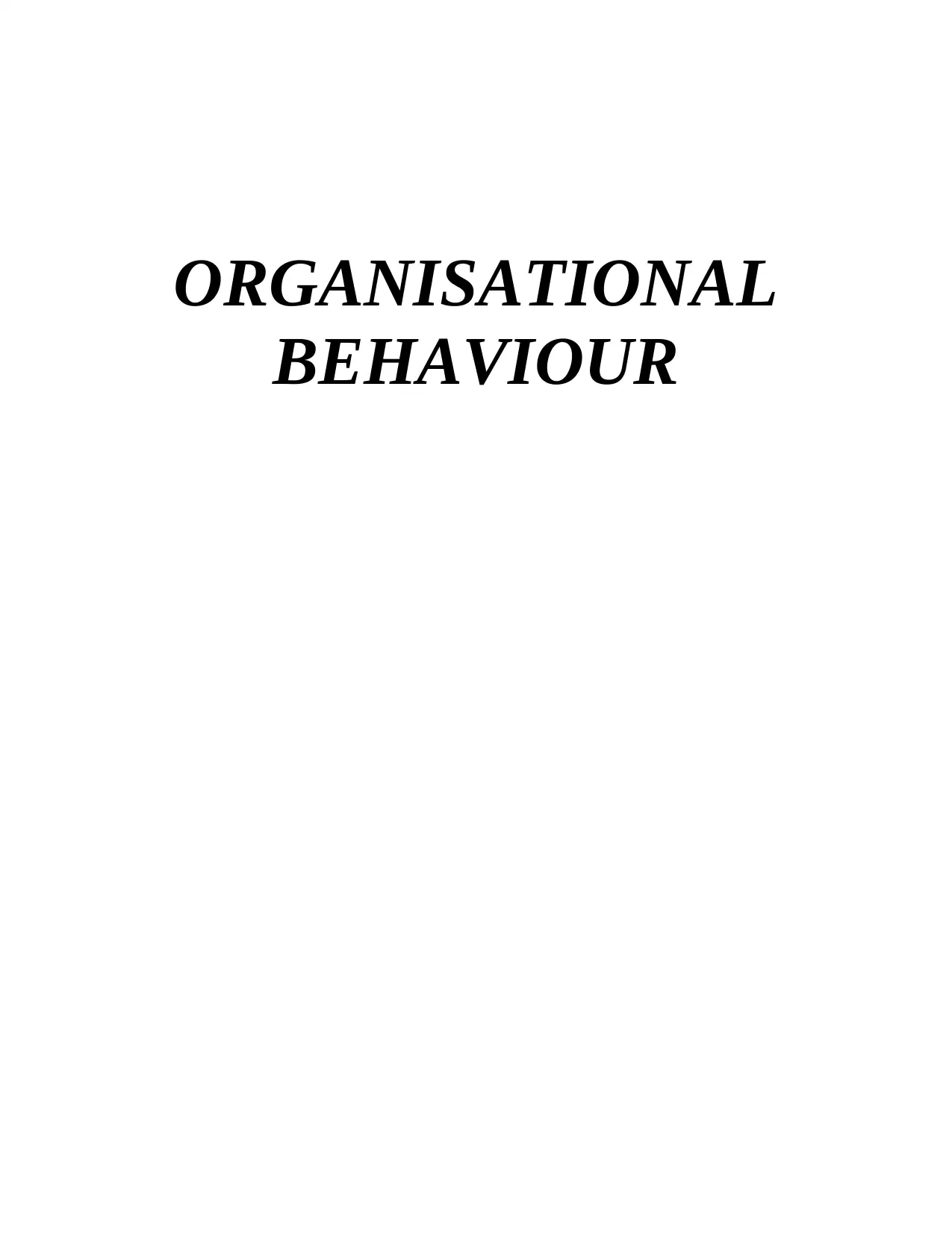
ORGANISATIONAL
BEHAVIOUR
BEHAVIOUR
Paraphrase This Document
Need a fresh take? Get an instant paraphrase of this document with our AI Paraphraser
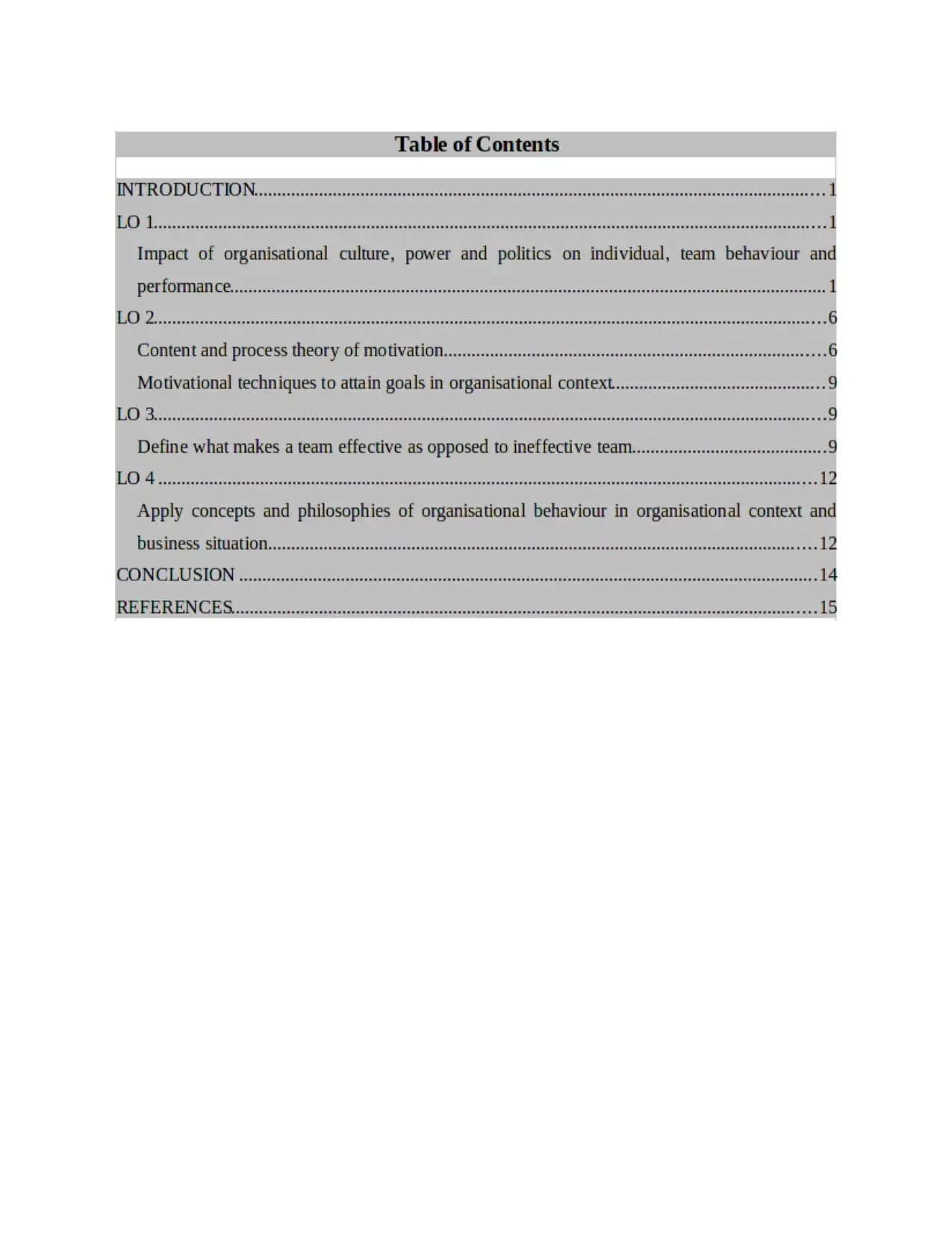
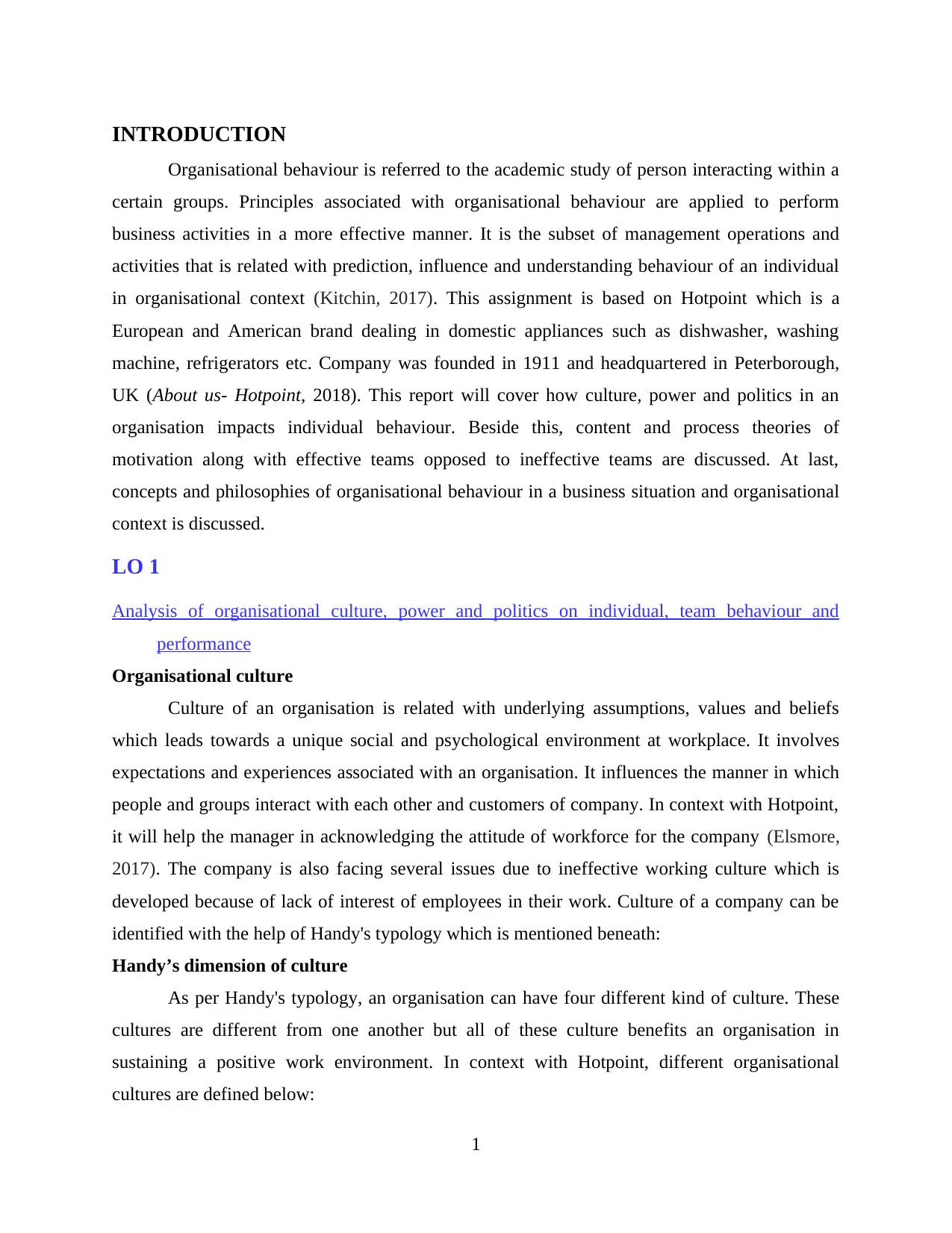
INTRODUCTION
Organisational behaviour is referred to the academic study of person interacting within a
certain groups. Principles associated with organisational behaviour are applied to perform
business activities in a more effective manner. It is the subset of management operations and
activities that is related with prediction, influence and understanding behaviour of an individual
in organisational context (Kitchin, 2017). This assignment is based on Hotpoint which is a
European and American brand dealing in domestic appliances such as dishwasher, washing
machine, refrigerators etc. Company was founded in 1911 and headquartered in Peterborough,
UK (About us- Hotpoint, 2018). This report will cover how culture, power and politics in an
organisation impacts individual behaviour. Beside this, content and process theories of
motivation along with effective teams opposed to ineffective teams are discussed. At last,
concepts and philosophies of organisational behaviour in a business situation and organisational
context is discussed.
LO 1
Analysis of organisational culture, power and politics on individual, team behaviour and
performance
Organisational culture
Culture of an organisation is related with underlying assumptions, values and beliefs
which leads towards a unique social and psychological environment at workplace. It involves
expectations and experiences associated with an organisation. It influences the manner in which
people and groups interact with each other and customers of company. In context with Hotpoint,
it will help the manager in acknowledging the attitude of workforce for the company (Elsmore,
2017). The company is also facing several issues due to ineffective working culture which is
developed because of lack of interest of employees in their work. Culture of a company can be
identified with the help of Handy's typology which is mentioned beneath:
Handy’s dimension of culture
As per Handy's typology, an organisation can have four different kind of culture. These
cultures are different from one another but all of these culture benefits an organisation in
sustaining a positive work environment. In context with Hotpoint, different organisational
cultures are defined below:
1
Organisational behaviour is referred to the academic study of person interacting within a
certain groups. Principles associated with organisational behaviour are applied to perform
business activities in a more effective manner. It is the subset of management operations and
activities that is related with prediction, influence and understanding behaviour of an individual
in organisational context (Kitchin, 2017). This assignment is based on Hotpoint which is a
European and American brand dealing in domestic appliances such as dishwasher, washing
machine, refrigerators etc. Company was founded in 1911 and headquartered in Peterborough,
UK (About us- Hotpoint, 2018). This report will cover how culture, power and politics in an
organisation impacts individual behaviour. Beside this, content and process theories of
motivation along with effective teams opposed to ineffective teams are discussed. At last,
concepts and philosophies of organisational behaviour in a business situation and organisational
context is discussed.
LO 1
Analysis of organisational culture, power and politics on individual, team behaviour and
performance
Organisational culture
Culture of an organisation is related with underlying assumptions, values and beliefs
which leads towards a unique social and psychological environment at workplace. It involves
expectations and experiences associated with an organisation. It influences the manner in which
people and groups interact with each other and customers of company. In context with Hotpoint,
it will help the manager in acknowledging the attitude of workforce for the company (Elsmore,
2017). The company is also facing several issues due to ineffective working culture which is
developed because of lack of interest of employees in their work. Culture of a company can be
identified with the help of Handy's typology which is mentioned beneath:
Handy’s dimension of culture
As per Handy's typology, an organisation can have four different kind of culture. These
cultures are different from one another but all of these culture benefits an organisation in
sustaining a positive work environment. In context with Hotpoint, different organisational
cultures are defined below:
1
⊘ This is a preview!⊘
Do you want full access?
Subscribe today to unlock all pages.

Trusted by 1+ million students worldwide
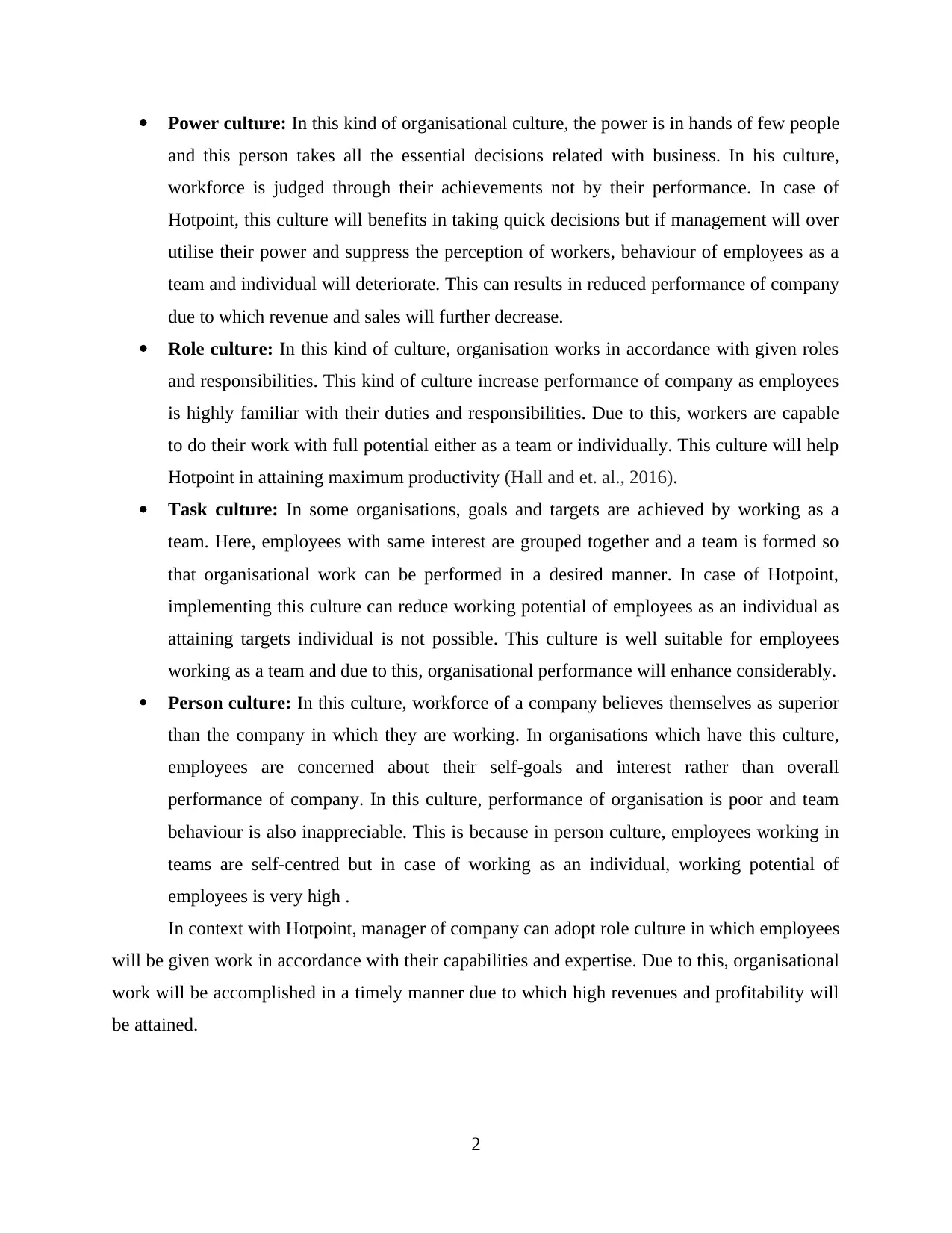
Power culture: In this kind of organisational culture, the power is in hands of few people
and this person takes all the essential decisions related with business. In his culture,
workforce is judged through their achievements not by their performance. In case of
Hotpoint, this culture will benefits in taking quick decisions but if management will over
utilise their power and suppress the perception of workers, behaviour of employees as a
team and individual will deteriorate. This can results in reduced performance of company
due to which revenue and sales will further decrease.
Role culture: In this kind of culture, organisation works in accordance with given roles
and responsibilities. This kind of culture increase performance of company as employees
is highly familiar with their duties and responsibilities. Due to this, workers are capable
to do their work with full potential either as a team or individually. This culture will help
Hotpoint in attaining maximum productivity (Hall and et. al., 2016).
Task culture: In some organisations, goals and targets are achieved by working as a
team. Here, employees with same interest are grouped together and a team is formed so
that organisational work can be performed in a desired manner. In case of Hotpoint,
implementing this culture can reduce working potential of employees as an individual as
attaining targets individual is not possible. This culture is well suitable for employees
working as a team and due to this, organisational performance will enhance considerably.
Person culture: In this culture, workforce of a company believes themselves as superior
than the company in which they are working. In organisations which have this culture,
employees are concerned about their self-goals and interest rather than overall
performance of company. In this culture, performance of organisation is poor and team
behaviour is also inappreciable. This is because in person culture, employees working in
teams are self-centred but in case of working as an individual, working potential of
employees is very high .
In context with Hotpoint, manager of company can adopt role culture in which employees
will be given work in accordance with their capabilities and expertise. Due to this, organisational
work will be accomplished in a timely manner due to which high revenues and profitability will
be attained.
2
and this person takes all the essential decisions related with business. In his culture,
workforce is judged through their achievements not by their performance. In case of
Hotpoint, this culture will benefits in taking quick decisions but if management will over
utilise their power and suppress the perception of workers, behaviour of employees as a
team and individual will deteriorate. This can results in reduced performance of company
due to which revenue and sales will further decrease.
Role culture: In this kind of culture, organisation works in accordance with given roles
and responsibilities. This kind of culture increase performance of company as employees
is highly familiar with their duties and responsibilities. Due to this, workers are capable
to do their work with full potential either as a team or individually. This culture will help
Hotpoint in attaining maximum productivity (Hall and et. al., 2016).
Task culture: In some organisations, goals and targets are achieved by working as a
team. Here, employees with same interest are grouped together and a team is formed so
that organisational work can be performed in a desired manner. In case of Hotpoint,
implementing this culture can reduce working potential of employees as an individual as
attaining targets individual is not possible. This culture is well suitable for employees
working as a team and due to this, organisational performance will enhance considerably.
Person culture: In this culture, workforce of a company believes themselves as superior
than the company in which they are working. In organisations which have this culture,
employees are concerned about their self-goals and interest rather than overall
performance of company. In this culture, performance of organisation is poor and team
behaviour is also inappreciable. This is because in person culture, employees working in
teams are self-centred but in case of working as an individual, working potential of
employees is very high .
In context with Hotpoint, manager of company can adopt role culture in which employees
will be given work in accordance with their capabilities and expertise. Due to this, organisational
work will be accomplished in a timely manner due to which high revenues and profitability will
be attained.
2
Paraphrase This Document
Need a fresh take? Get an instant paraphrase of this document with our AI Paraphraser
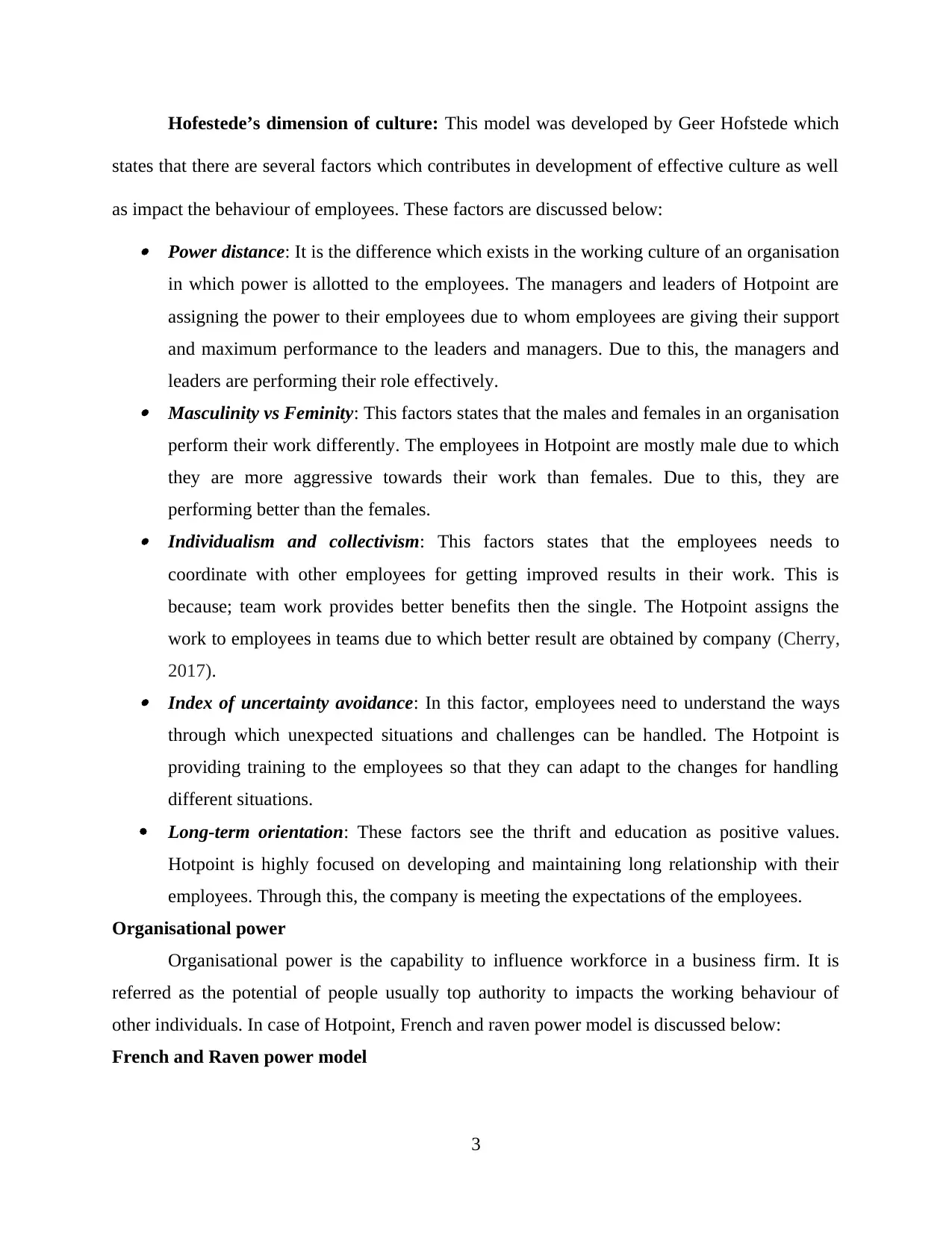
Hofestede’s dimension of culture: This model was developed by Geer Hofstede which
states that there are several factors which contributes in development of effective culture as well
as impact the behaviour of employees. These factors are discussed below: Power distance: It is the difference which exists in the working culture of an organisation
in which power is allotted to the employees. The managers and leaders of Hotpoint are
assigning the power to their employees due to whom employees are giving their support
and maximum performance to the leaders and managers. Due to this, the managers and
leaders are performing their role effectively. Masculinity vs Feminity: This factors states that the males and females in an organisation
perform their work differently. The employees in Hotpoint are mostly male due to which
they are more aggressive towards their work than females. Due to this, they are
performing better than the females. Individualism and collectivism: This factors states that the employees needs to
coordinate with other employees for getting improved results in their work. This is
because; team work provides better benefits then the single. The Hotpoint assigns the
work to employees in teams due to which better result are obtained by company (Cherry,
2017). Index of uncertainty avoidance: In this factor, employees need to understand the ways
through which unexpected situations and challenges can be handled. The Hotpoint is
providing training to the employees so that they can adapt to the changes for handling
different situations.
Long-term orientation: These factors see the thrift and education as positive values.
Hotpoint is highly focused on developing and maintaining long relationship with their
employees. Through this, the company is meeting the expectations of the employees.
Organisational power
Organisational power is the capability to influence workforce in a business firm. It is
referred as the potential of people usually top authority to impacts the working behaviour of
other individuals. In case of Hotpoint, French and raven power model is discussed below:
French and Raven power model
3
states that there are several factors which contributes in development of effective culture as well
as impact the behaviour of employees. These factors are discussed below: Power distance: It is the difference which exists in the working culture of an organisation
in which power is allotted to the employees. The managers and leaders of Hotpoint are
assigning the power to their employees due to whom employees are giving their support
and maximum performance to the leaders and managers. Due to this, the managers and
leaders are performing their role effectively. Masculinity vs Feminity: This factors states that the males and females in an organisation
perform their work differently. The employees in Hotpoint are mostly male due to which
they are more aggressive towards their work than females. Due to this, they are
performing better than the females. Individualism and collectivism: This factors states that the employees needs to
coordinate with other employees for getting improved results in their work. This is
because; team work provides better benefits then the single. The Hotpoint assigns the
work to employees in teams due to which better result are obtained by company (Cherry,
2017). Index of uncertainty avoidance: In this factor, employees need to understand the ways
through which unexpected situations and challenges can be handled. The Hotpoint is
providing training to the employees so that they can adapt to the changes for handling
different situations.
Long-term orientation: These factors see the thrift and education as positive values.
Hotpoint is highly focused on developing and maintaining long relationship with their
employees. Through this, the company is meeting the expectations of the employees.
Organisational power
Organisational power is the capability to influence workforce in a business firm. It is
referred as the potential of people usually top authority to impacts the working behaviour of
other individuals. In case of Hotpoint, French and raven power model is discussed below:
French and Raven power model
3
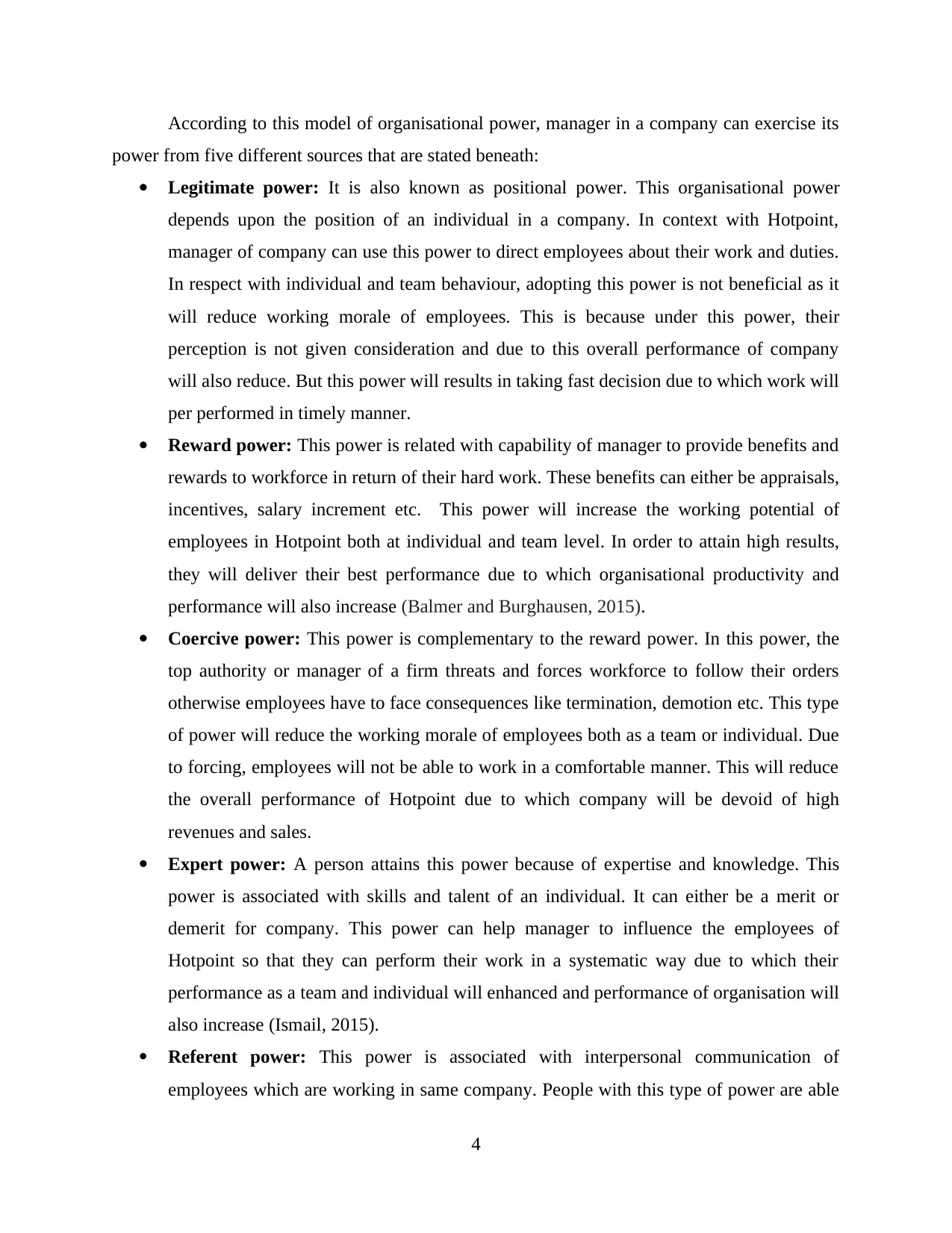
According to this model of organisational power, manager in a company can exercise its
power from five different sources that are stated beneath:
Legitimate power: It is also known as positional power. This organisational power
depends upon the position of an individual in a company. In context with Hotpoint,
manager of company can use this power to direct employees about their work and duties.
In respect with individual and team behaviour, adopting this power is not beneficial as it
will reduce working morale of employees. This is because under this power, their
perception is not given consideration and due to this overall performance of company
will also reduce. But this power will results in taking fast decision due to which work will
per performed in timely manner.
Reward power: This power is related with capability of manager to provide benefits and
rewards to workforce in return of their hard work. These benefits can either be appraisals,
incentives, salary increment etc. This power will increase the working potential of
employees in Hotpoint both at individual and team level. In order to attain high results,
they will deliver their best performance due to which organisational productivity and
performance will also increase (Balmer and Burghausen, 2015).
Coercive power: This power is complementary to the reward power. In this power, the
top authority or manager of a firm threats and forces workforce to follow their orders
otherwise employees have to face consequences like termination, demotion etc. This type
of power will reduce the working morale of employees both as a team or individual. Due
to forcing, employees will not be able to work in a comfortable manner. This will reduce
the overall performance of Hotpoint due to which company will be devoid of high
revenues and sales.
Expert power: A person attains this power because of expertise and knowledge. This
power is associated with skills and talent of an individual. It can either be a merit or
demerit for company. This power can help manager to influence the employees of
Hotpoint so that they can perform their work in a systematic way due to which their
performance as a team and individual will enhanced and performance of organisation will
also increase (Ismail, 2015).
Referent power: This power is associated with interpersonal communication of
employees which are working in same company. People with this type of power are able
4
power from five different sources that are stated beneath:
Legitimate power: It is also known as positional power. This organisational power
depends upon the position of an individual in a company. In context with Hotpoint,
manager of company can use this power to direct employees about their work and duties.
In respect with individual and team behaviour, adopting this power is not beneficial as it
will reduce working morale of employees. This is because under this power, their
perception is not given consideration and due to this overall performance of company
will also reduce. But this power will results in taking fast decision due to which work will
per performed in timely manner.
Reward power: This power is related with capability of manager to provide benefits and
rewards to workforce in return of their hard work. These benefits can either be appraisals,
incentives, salary increment etc. This power will increase the working potential of
employees in Hotpoint both at individual and team level. In order to attain high results,
they will deliver their best performance due to which organisational productivity and
performance will also increase (Balmer and Burghausen, 2015).
Coercive power: This power is complementary to the reward power. In this power, the
top authority or manager of a firm threats and forces workforce to follow their orders
otherwise employees have to face consequences like termination, demotion etc. This type
of power will reduce the working morale of employees both as a team or individual. Due
to forcing, employees will not be able to work in a comfortable manner. This will reduce
the overall performance of Hotpoint due to which company will be devoid of high
revenues and sales.
Expert power: A person attains this power because of expertise and knowledge. This
power is associated with skills and talent of an individual. It can either be a merit or
demerit for company. This power can help manager to influence the employees of
Hotpoint so that they can perform their work in a systematic way due to which their
performance as a team and individual will enhanced and performance of organisation will
also increase (Ismail, 2015).
Referent power: This power is associated with interpersonal communication of
employees which are working in same company. People with this type of power are able
4
⊘ This is a preview!⊘
Do you want full access?
Subscribe today to unlock all pages.

Trusted by 1+ million students worldwide
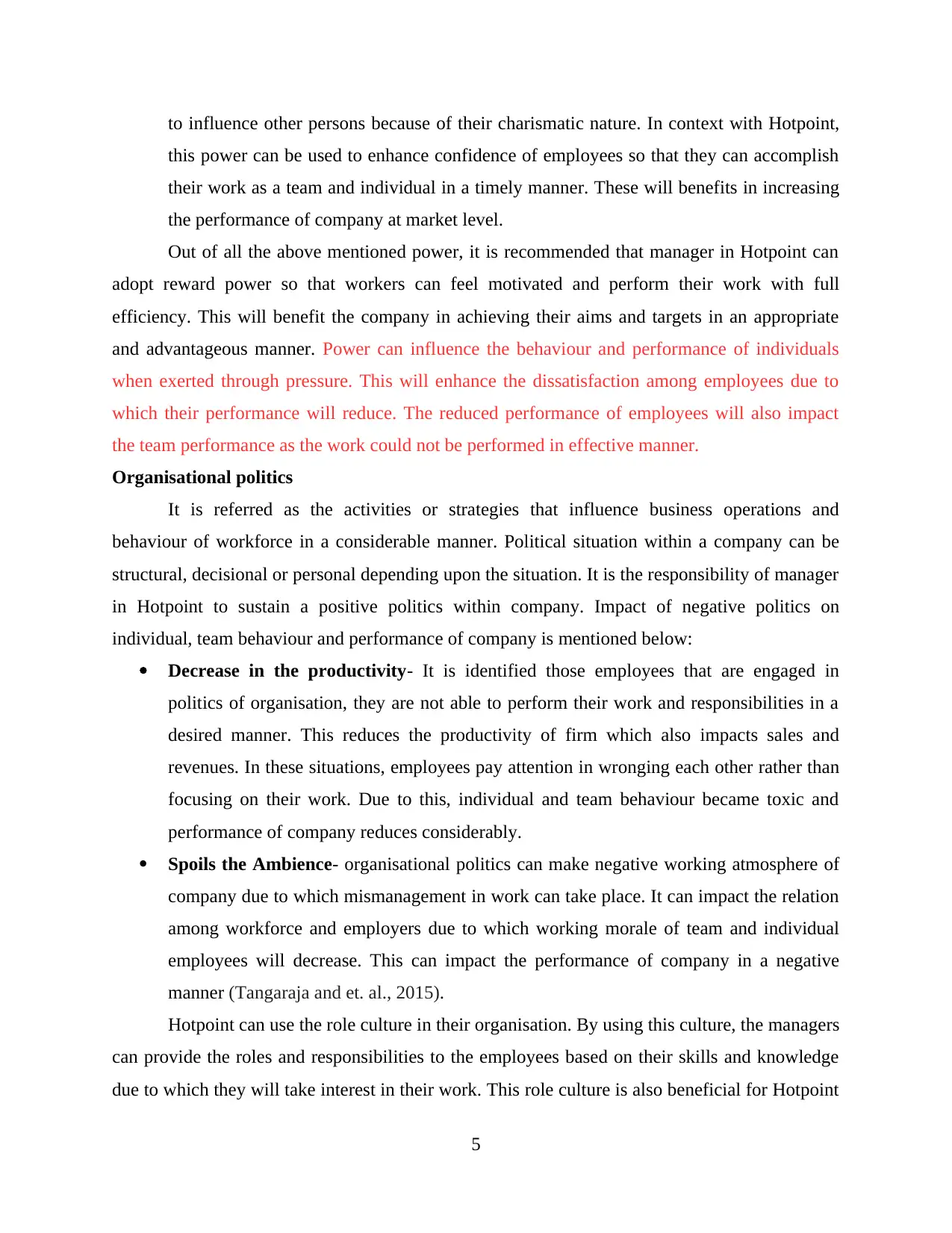
to influence other persons because of their charismatic nature. In context with Hotpoint,
this power can be used to enhance confidence of employees so that they can accomplish
their work as a team and individual in a timely manner. These will benefits in increasing
the performance of company at market level.
Out of all the above mentioned power, it is recommended that manager in Hotpoint can
adopt reward power so that workers can feel motivated and perform their work with full
efficiency. This will benefit the company in achieving their aims and targets in an appropriate
and advantageous manner. Power can influence the behaviour and performance of individuals
when exerted through pressure. This will enhance the dissatisfaction among employees due to
which their performance will reduce. The reduced performance of employees will also impact
the team performance as the work could not be performed in effective manner.
Organisational politics
It is referred as the activities or strategies that influence business operations and
behaviour of workforce in a considerable manner. Political situation within a company can be
structural, decisional or personal depending upon the situation. It is the responsibility of manager
in Hotpoint to sustain a positive politics within company. Impact of negative politics on
individual, team behaviour and performance of company is mentioned below:
Decrease in the productivity- It is identified those employees that are engaged in
politics of organisation, they are not able to perform their work and responsibilities in a
desired manner. This reduces the productivity of firm which also impacts sales and
revenues. In these situations, employees pay attention in wronging each other rather than
focusing on their work. Due to this, individual and team behaviour became toxic and
performance of company reduces considerably.
Spoils the Ambience- organisational politics can make negative working atmosphere of
company due to which mismanagement in work can take place. It can impact the relation
among workforce and employers due to which working morale of team and individual
employees will decrease. This can impact the performance of company in a negative
manner (Tangaraja and et. al., 2015).
Hotpoint can use the role culture in their organisation. By using this culture, the managers
can provide the roles and responsibilities to the employees based on their skills and knowledge
due to which they will take interest in their work. This role culture is also beneficial for Hotpoint
5
this power can be used to enhance confidence of employees so that they can accomplish
their work as a team and individual in a timely manner. These will benefits in increasing
the performance of company at market level.
Out of all the above mentioned power, it is recommended that manager in Hotpoint can
adopt reward power so that workers can feel motivated and perform their work with full
efficiency. This will benefit the company in achieving their aims and targets in an appropriate
and advantageous manner. Power can influence the behaviour and performance of individuals
when exerted through pressure. This will enhance the dissatisfaction among employees due to
which their performance will reduce. The reduced performance of employees will also impact
the team performance as the work could not be performed in effective manner.
Organisational politics
It is referred as the activities or strategies that influence business operations and
behaviour of workforce in a considerable manner. Political situation within a company can be
structural, decisional or personal depending upon the situation. It is the responsibility of manager
in Hotpoint to sustain a positive politics within company. Impact of negative politics on
individual, team behaviour and performance of company is mentioned below:
Decrease in the productivity- It is identified those employees that are engaged in
politics of organisation, they are not able to perform their work and responsibilities in a
desired manner. This reduces the productivity of firm which also impacts sales and
revenues. In these situations, employees pay attention in wronging each other rather than
focusing on their work. Due to this, individual and team behaviour became toxic and
performance of company reduces considerably.
Spoils the Ambience- organisational politics can make negative working atmosphere of
company due to which mismanagement in work can take place. It can impact the relation
among workforce and employers due to which working morale of team and individual
employees will decrease. This can impact the performance of company in a negative
manner (Tangaraja and et. al., 2015).
Hotpoint can use the role culture in their organisation. By using this culture, the managers
can provide the roles and responsibilities to the employees based on their skills and knowledge
due to which they will take interest in their work. This role culture is also beneficial for Hotpoint
5
Paraphrase This Document
Need a fresh take? Get an instant paraphrase of this document with our AI Paraphraser
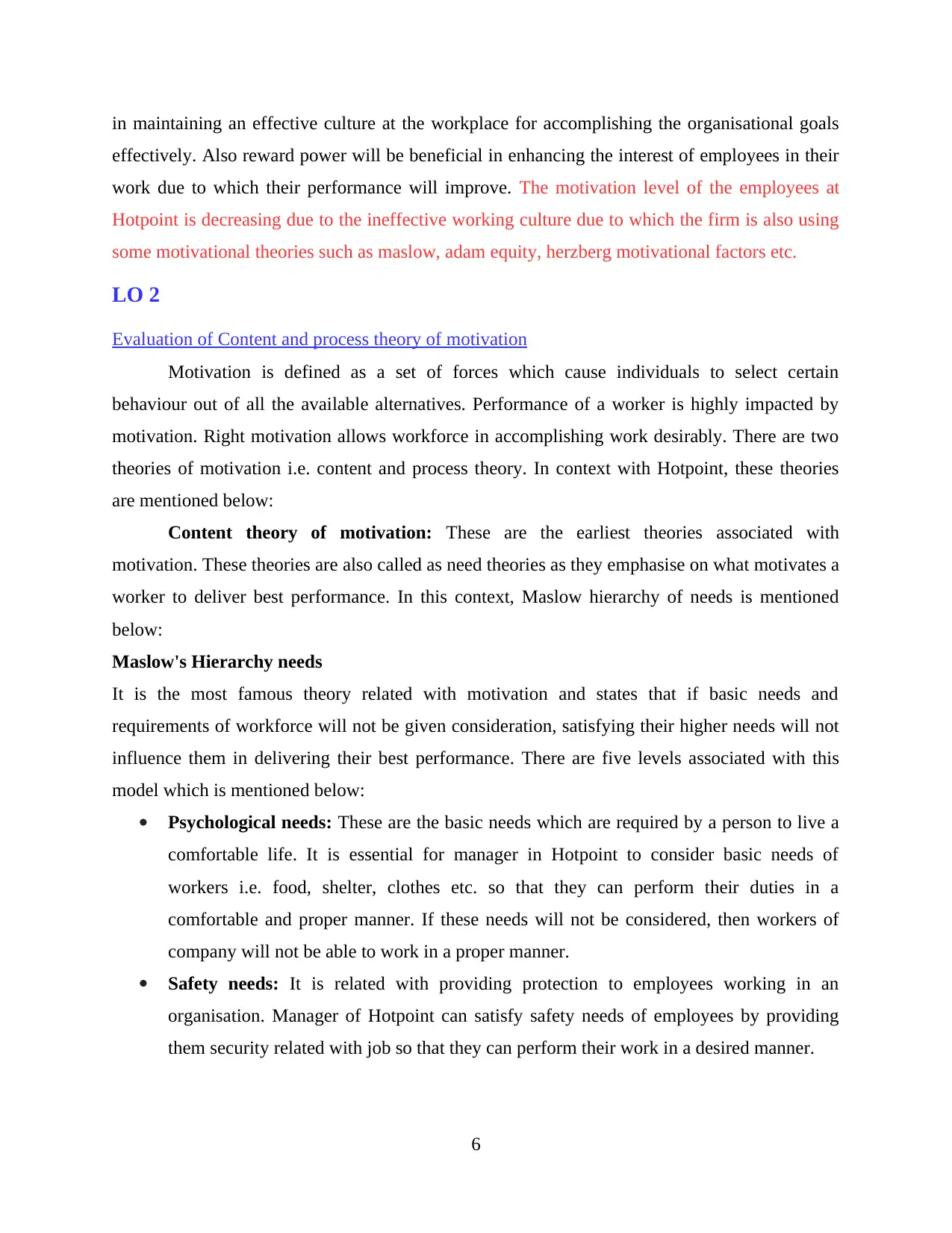
in maintaining an effective culture at the workplace for accomplishing the organisational goals
effectively. Also reward power will be beneficial in enhancing the interest of employees in their
work due to which their performance will improve. The motivation level of the employees at
Hotpoint is decreasing due to the ineffective working culture due to which the firm is also using
some motivational theories such as maslow, adam equity, herzberg motivational factors etc.
LO 2
Evaluation of Content and process theory of motivation
Motivation is defined as a set of forces which cause individuals to select certain
behaviour out of all the available alternatives. Performance of a worker is highly impacted by
motivation. Right motivation allows workforce in accomplishing work desirably. There are two
theories of motivation i.e. content and process theory. In context with Hotpoint, these theories
are mentioned below:
Content theory of motivation: These are the earliest theories associated with
motivation. These theories are also called as need theories as they emphasise on what motivates a
worker to deliver best performance. In this context, Maslow hierarchy of needs is mentioned
below:
Maslow's Hierarchy needs
It is the most famous theory related with motivation and states that if basic needs and
requirements of workforce will not be given consideration, satisfying their higher needs will not
influence them in delivering their best performance. There are five levels associated with this
model which is mentioned below:
Psychological needs: These are the basic needs which are required by a person to live a
comfortable life. It is essential for manager in Hotpoint to consider basic needs of
workers i.e. food, shelter, clothes etc. so that they can perform their duties in a
comfortable and proper manner. If these needs will not be considered, then workers of
company will not be able to work in a proper manner.
Safety needs: It is related with providing protection to employees working in an
organisation. Manager of Hotpoint can satisfy safety needs of employees by providing
them security related with job so that they can perform their work in a desired manner.
6
effectively. Also reward power will be beneficial in enhancing the interest of employees in their
work due to which their performance will improve. The motivation level of the employees at
Hotpoint is decreasing due to the ineffective working culture due to which the firm is also using
some motivational theories such as maslow, adam equity, herzberg motivational factors etc.
LO 2
Evaluation of Content and process theory of motivation
Motivation is defined as a set of forces which cause individuals to select certain
behaviour out of all the available alternatives. Performance of a worker is highly impacted by
motivation. Right motivation allows workforce in accomplishing work desirably. There are two
theories of motivation i.e. content and process theory. In context with Hotpoint, these theories
are mentioned below:
Content theory of motivation: These are the earliest theories associated with
motivation. These theories are also called as need theories as they emphasise on what motivates a
worker to deliver best performance. In this context, Maslow hierarchy of needs is mentioned
below:
Maslow's Hierarchy needs
It is the most famous theory related with motivation and states that if basic needs and
requirements of workforce will not be given consideration, satisfying their higher needs will not
influence them in delivering their best performance. There are five levels associated with this
model which is mentioned below:
Psychological needs: These are the basic needs which are required by a person to live a
comfortable life. It is essential for manager in Hotpoint to consider basic needs of
workers i.e. food, shelter, clothes etc. so that they can perform their duties in a
comfortable and proper manner. If these needs will not be considered, then workers of
company will not be able to work in a proper manner.
Safety needs: It is related with providing protection to employees working in an
organisation. Manager of Hotpoint can satisfy safety needs of employees by providing
them security related with job so that they can perform their work in a desired manner.
6
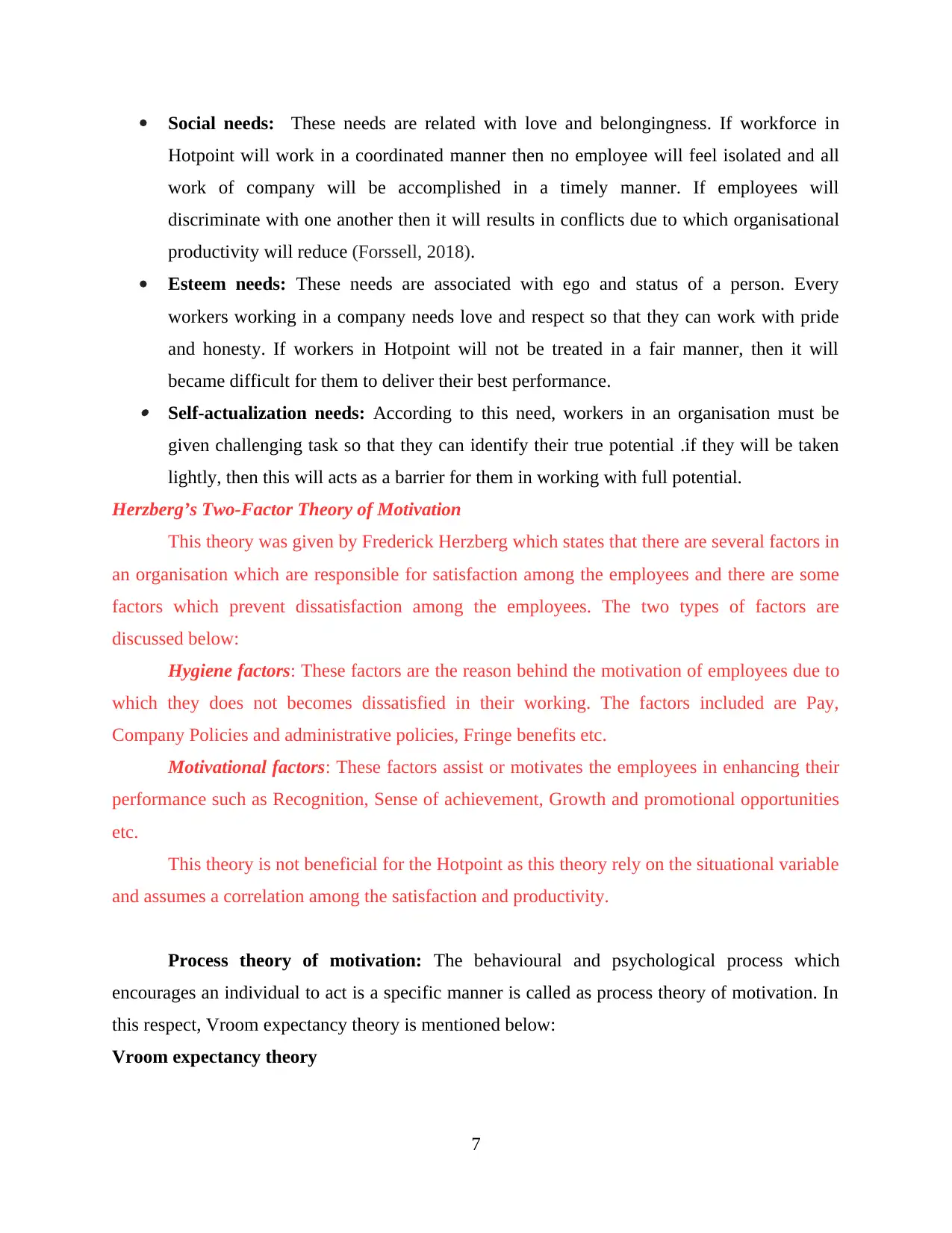
Social needs: These needs are related with love and belongingness. If workforce in
Hotpoint will work in a coordinated manner then no employee will feel isolated and all
work of company will be accomplished in a timely manner. If employees will
discriminate with one another then it will results in conflicts due to which organisational
productivity will reduce (Forssell, 2018).
Esteem needs: These needs are associated with ego and status of a person. Every
workers working in a company needs love and respect so that they can work with pride
and honesty. If workers in Hotpoint will not be treated in a fair manner, then it will
became difficult for them to deliver their best performance. Self-actualization needs: According to this need, workers in an organisation must be
given challenging task so that they can identify their true potential .if they will be taken
lightly, then this will acts as a barrier for them in working with full potential.
Herzberg’s Two-Factor Theory of Motivation
This theory was given by Frederick Herzberg which states that there are several factors in
an organisation which are responsible for satisfaction among the employees and there are some
factors which prevent dissatisfaction among the employees. The two types of factors are
discussed below:
Hygiene factors: These factors are the reason behind the motivation of employees due to
which they does not becomes dissatisfied in their working. The factors included are Pay,
Company Policies and administrative policies, Fringe benefits etc.
Motivational factors: These factors assist or motivates the employees in enhancing their
performance such as Recognition, Sense of achievement, Growth and promotional opportunities
etc.
This theory is not beneficial for the Hotpoint as this theory rely on the situational variable
and assumes a correlation among the satisfaction and productivity.
Process theory of motivation: The behavioural and psychological process which
encourages an individual to act is a specific manner is called as process theory of motivation. In
this respect, Vroom expectancy theory is mentioned below:
Vroom expectancy theory
7
Hotpoint will work in a coordinated manner then no employee will feel isolated and all
work of company will be accomplished in a timely manner. If employees will
discriminate with one another then it will results in conflicts due to which organisational
productivity will reduce (Forssell, 2018).
Esteem needs: These needs are associated with ego and status of a person. Every
workers working in a company needs love and respect so that they can work with pride
and honesty. If workers in Hotpoint will not be treated in a fair manner, then it will
became difficult for them to deliver their best performance. Self-actualization needs: According to this need, workers in an organisation must be
given challenging task so that they can identify their true potential .if they will be taken
lightly, then this will acts as a barrier for them in working with full potential.
Herzberg’s Two-Factor Theory of Motivation
This theory was given by Frederick Herzberg which states that there are several factors in
an organisation which are responsible for satisfaction among the employees and there are some
factors which prevent dissatisfaction among the employees. The two types of factors are
discussed below:
Hygiene factors: These factors are the reason behind the motivation of employees due to
which they does not becomes dissatisfied in their working. The factors included are Pay,
Company Policies and administrative policies, Fringe benefits etc.
Motivational factors: These factors assist or motivates the employees in enhancing their
performance such as Recognition, Sense of achievement, Growth and promotional opportunities
etc.
This theory is not beneficial for the Hotpoint as this theory rely on the situational variable
and assumes a correlation among the satisfaction and productivity.
Process theory of motivation: The behavioural and psychological process which
encourages an individual to act is a specific manner is called as process theory of motivation. In
this respect, Vroom expectancy theory is mentioned below:
Vroom expectancy theory
7
⊘ This is a preview!⊘
Do you want full access?
Subscribe today to unlock all pages.

Trusted by 1+ million students worldwide
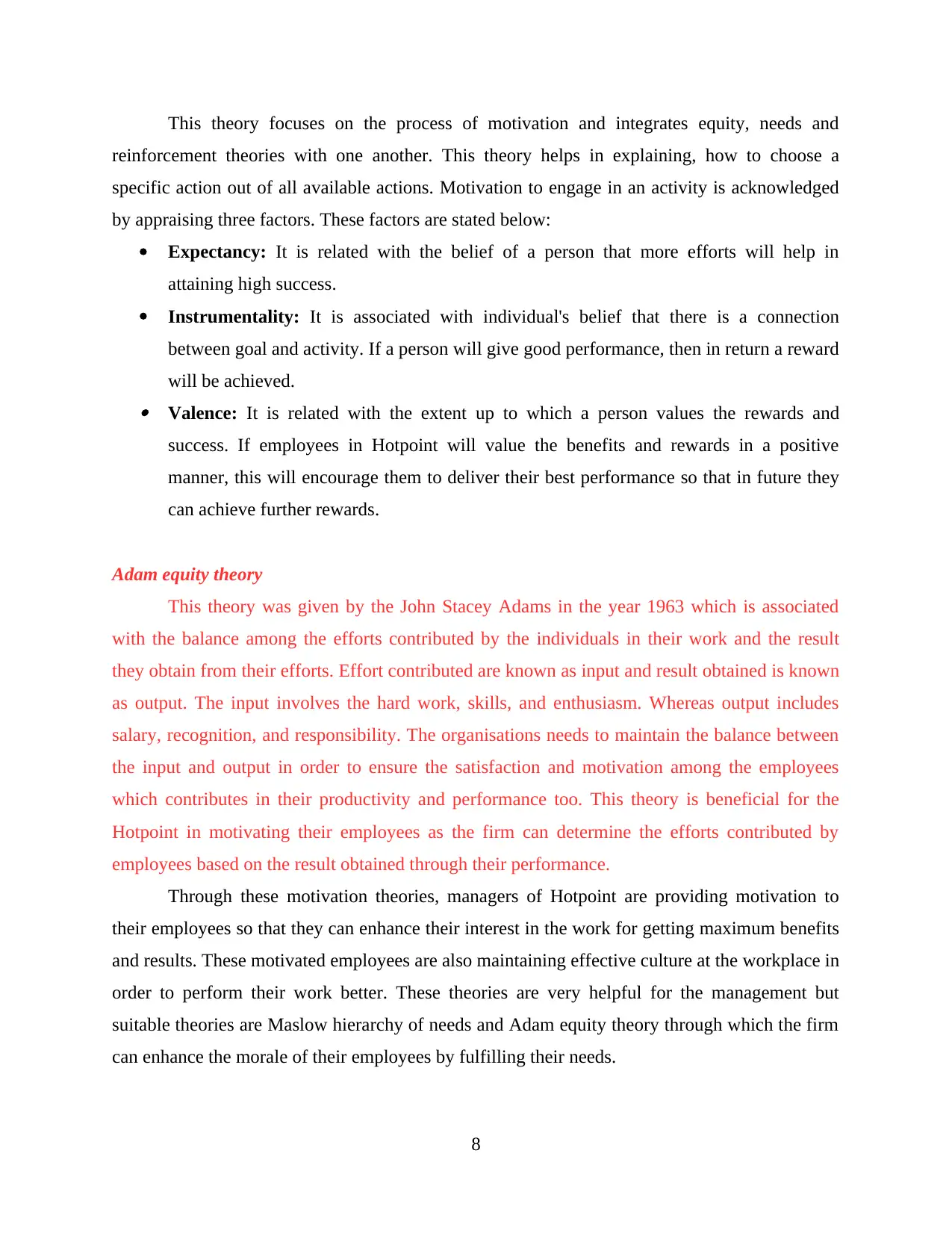
This theory focuses on the process of motivation and integrates equity, needs and
reinforcement theories with one another. This theory helps in explaining, how to choose a
specific action out of all available actions. Motivation to engage in an activity is acknowledged
by appraising three factors. These factors are stated below:
Expectancy: It is related with the belief of a person that more efforts will help in
attaining high success.
Instrumentality: It is associated with individual's belief that there is a connection
between goal and activity. If a person will give good performance, then in return a reward
will be achieved. Valence: It is related with the extent up to which a person values the rewards and
success. If employees in Hotpoint will value the benefits and rewards in a positive
manner, this will encourage them to deliver their best performance so that in future they
can achieve further rewards.
Adam equity theory
This theory was given by the John Stacey Adams in the year 1963 which is associated
with the balance among the efforts contributed by the individuals in their work and the result
they obtain from their efforts. Effort contributed are known as input and result obtained is known
as output. The input involves the hard work, skills, and enthusiasm. Whereas output includes
salary, recognition, and responsibility. The organisations needs to maintain the balance between
the input and output in order to ensure the satisfaction and motivation among the employees
which contributes in their productivity and performance too. This theory is beneficial for the
Hotpoint in motivating their employees as the firm can determine the efforts contributed by
employees based on the result obtained through their performance.
Through these motivation theories, managers of Hotpoint are providing motivation to
their employees so that they can enhance their interest in the work for getting maximum benefits
and results. These motivated employees are also maintaining effective culture at the workplace in
order to perform their work better. These theories are very helpful for the management but
suitable theories are Maslow hierarchy of needs and Adam equity theory through which the firm
can enhance the morale of their employees by fulfilling their needs.
8
reinforcement theories with one another. This theory helps in explaining, how to choose a
specific action out of all available actions. Motivation to engage in an activity is acknowledged
by appraising three factors. These factors are stated below:
Expectancy: It is related with the belief of a person that more efforts will help in
attaining high success.
Instrumentality: It is associated with individual's belief that there is a connection
between goal and activity. If a person will give good performance, then in return a reward
will be achieved. Valence: It is related with the extent up to which a person values the rewards and
success. If employees in Hotpoint will value the benefits and rewards in a positive
manner, this will encourage them to deliver their best performance so that in future they
can achieve further rewards.
Adam equity theory
This theory was given by the John Stacey Adams in the year 1963 which is associated
with the balance among the efforts contributed by the individuals in their work and the result
they obtain from their efforts. Effort contributed are known as input and result obtained is known
as output. The input involves the hard work, skills, and enthusiasm. Whereas output includes
salary, recognition, and responsibility. The organisations needs to maintain the balance between
the input and output in order to ensure the satisfaction and motivation among the employees
which contributes in their productivity and performance too. This theory is beneficial for the
Hotpoint in motivating their employees as the firm can determine the efforts contributed by
employees based on the result obtained through their performance.
Through these motivation theories, managers of Hotpoint are providing motivation to
their employees so that they can enhance their interest in the work for getting maximum benefits
and results. These motivated employees are also maintaining effective culture at the workplace in
order to perform their work better. These theories are very helpful for the management but
suitable theories are Maslow hierarchy of needs and Adam equity theory through which the firm
can enhance the morale of their employees by fulfilling their needs.
8
Paraphrase This Document
Need a fresh take? Get an instant paraphrase of this document with our AI Paraphraser
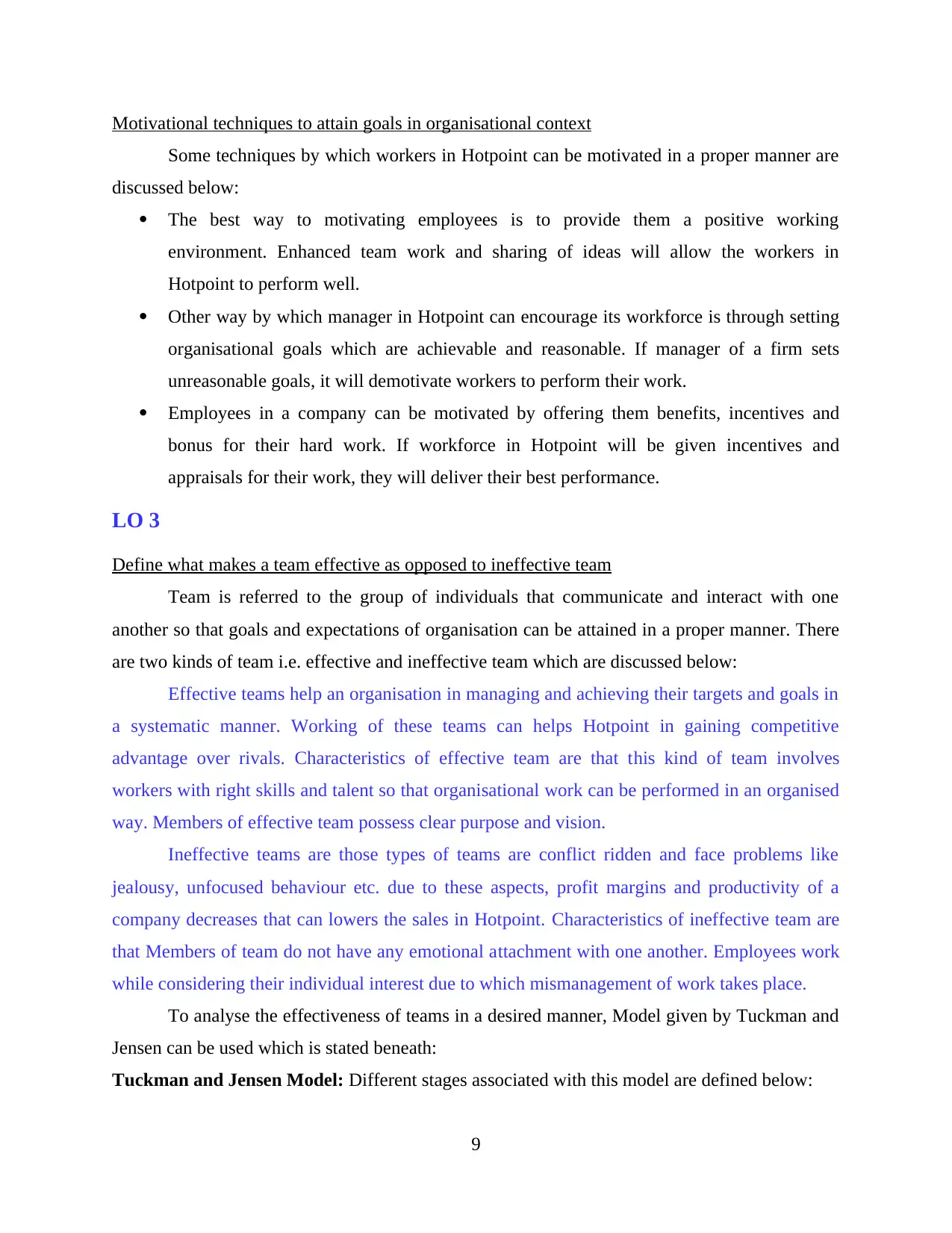
Motivational techniques to attain goals in organisational context
Some techniques by which workers in Hotpoint can be motivated in a proper manner are
discussed below:
The best way to motivating employees is to provide them a positive working
environment. Enhanced team work and sharing of ideas will allow the workers in
Hotpoint to perform well.
Other way by which manager in Hotpoint can encourage its workforce is through setting
organisational goals which are achievable and reasonable. If manager of a firm sets
unreasonable goals, it will demotivate workers to perform their work.
Employees in a company can be motivated by offering them benefits, incentives and
bonus for their hard work. If workforce in Hotpoint will be given incentives and
appraisals for their work, they will deliver their best performance.
LO 3
Define what makes a team effective as opposed to ineffective team
Team is referred to the group of individuals that communicate and interact with one
another so that goals and expectations of organisation can be attained in a proper manner. There
are two kinds of team i.e. effective and ineffective team which are discussed below:
Effective teams help an organisation in managing and achieving their targets and goals in
a systematic manner. Working of these teams can helps Hotpoint in gaining competitive
advantage over rivals. Characteristics of effective team are that this kind of team involves
workers with right skills and talent so that organisational work can be performed in an organised
way. Members of effective team possess clear purpose and vision.
Ineffective teams are those types of teams are conflict ridden and face problems like
jealousy, unfocused behaviour etc. due to these aspects, profit margins and productivity of a
company decreases that can lowers the sales in Hotpoint. Characteristics of ineffective team are
that Members of team do not have any emotional attachment with one another. Employees work
while considering their individual interest due to which mismanagement of work takes place.
To analyse the effectiveness of teams in a desired manner, Model given by Tuckman and
Jensen can be used which is stated beneath:
Tuckman and Jensen Model: Different stages associated with this model are defined below:
9
Some techniques by which workers in Hotpoint can be motivated in a proper manner are
discussed below:
The best way to motivating employees is to provide them a positive working
environment. Enhanced team work and sharing of ideas will allow the workers in
Hotpoint to perform well.
Other way by which manager in Hotpoint can encourage its workforce is through setting
organisational goals which are achievable and reasonable. If manager of a firm sets
unreasonable goals, it will demotivate workers to perform their work.
Employees in a company can be motivated by offering them benefits, incentives and
bonus for their hard work. If workforce in Hotpoint will be given incentives and
appraisals for their work, they will deliver their best performance.
LO 3
Define what makes a team effective as opposed to ineffective team
Team is referred to the group of individuals that communicate and interact with one
another so that goals and expectations of organisation can be attained in a proper manner. There
are two kinds of team i.e. effective and ineffective team which are discussed below:
Effective teams help an organisation in managing and achieving their targets and goals in
a systematic manner. Working of these teams can helps Hotpoint in gaining competitive
advantage over rivals. Characteristics of effective team are that this kind of team involves
workers with right skills and talent so that organisational work can be performed in an organised
way. Members of effective team possess clear purpose and vision.
Ineffective teams are those types of teams are conflict ridden and face problems like
jealousy, unfocused behaviour etc. due to these aspects, profit margins and productivity of a
company decreases that can lowers the sales in Hotpoint. Characteristics of ineffective team are
that Members of team do not have any emotional attachment with one another. Employees work
while considering their individual interest due to which mismanagement of work takes place.
To analyse the effectiveness of teams in a desired manner, Model given by Tuckman and
Jensen can be used which is stated beneath:
Tuckman and Jensen Model: Different stages associated with this model are defined below:
9
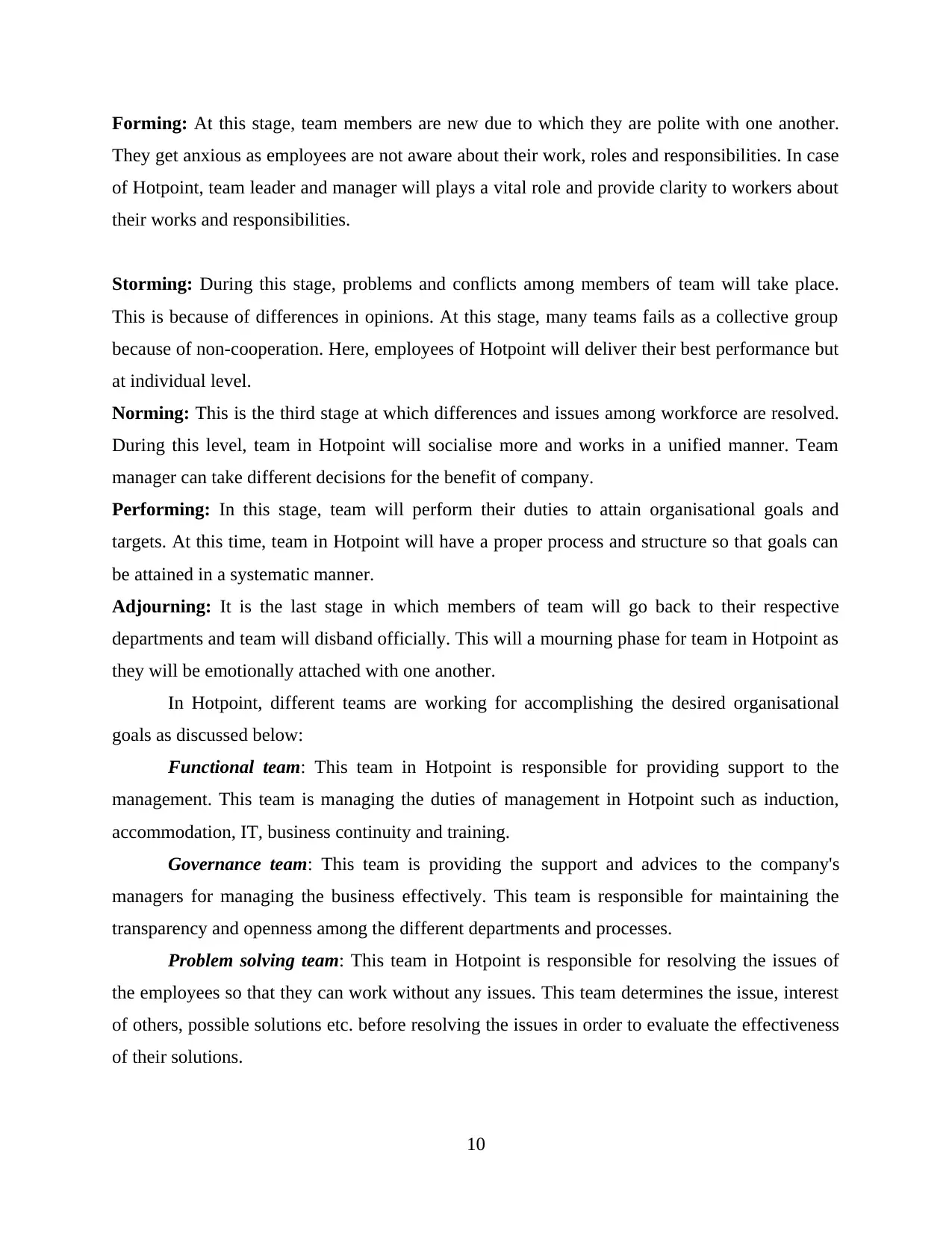
Forming: At this stage, team members are new due to which they are polite with one another.
They get anxious as employees are not aware about their work, roles and responsibilities. In case
of Hotpoint, team leader and manager will plays a vital role and provide clarity to workers about
their works and responsibilities.
Storming: During this stage, problems and conflicts among members of team will take place.
This is because of differences in opinions. At this stage, many teams fails as a collective group
because of non-cooperation. Here, employees of Hotpoint will deliver their best performance but
at individual level.
Norming: This is the third stage at which differences and issues among workforce are resolved.
During this level, team in Hotpoint will socialise more and works in a unified manner. Team
manager can take different decisions for the benefit of company.
Performing: In this stage, team will perform their duties to attain organisational goals and
targets. At this time, team in Hotpoint will have a proper process and structure so that goals can
be attained in a systematic manner.
Adjourning: It is the last stage in which members of team will go back to their respective
departments and team will disband officially. This will a mourning phase for team in Hotpoint as
they will be emotionally attached with one another.
In Hotpoint, different teams are working for accomplishing the desired organisational
goals as discussed below:
Functional team: This team in Hotpoint is responsible for providing support to the
management. This team is managing the duties of management in Hotpoint such as induction,
accommodation, IT, business continuity and training.
Governance team: This team is providing the support and advices to the company's
managers for managing the business effectively. This team is responsible for maintaining the
transparency and openness among the different departments and processes.
Problem solving team: This team in Hotpoint is responsible for resolving the issues of
the employees so that they can work without any issues. This team determines the issue, interest
of others, possible solutions etc. before resolving the issues in order to evaluate the effectiveness
of their solutions.
10
They get anxious as employees are not aware about their work, roles and responsibilities. In case
of Hotpoint, team leader and manager will plays a vital role and provide clarity to workers about
their works and responsibilities.
Storming: During this stage, problems and conflicts among members of team will take place.
This is because of differences in opinions. At this stage, many teams fails as a collective group
because of non-cooperation. Here, employees of Hotpoint will deliver their best performance but
at individual level.
Norming: This is the third stage at which differences and issues among workforce are resolved.
During this level, team in Hotpoint will socialise more and works in a unified manner. Team
manager can take different decisions for the benefit of company.
Performing: In this stage, team will perform their duties to attain organisational goals and
targets. At this time, team in Hotpoint will have a proper process and structure so that goals can
be attained in a systematic manner.
Adjourning: It is the last stage in which members of team will go back to their respective
departments and team will disband officially. This will a mourning phase for team in Hotpoint as
they will be emotionally attached with one another.
In Hotpoint, different teams are working for accomplishing the desired organisational
goals as discussed below:
Functional team: This team in Hotpoint is responsible for providing support to the
management. This team is managing the duties of management in Hotpoint such as induction,
accommodation, IT, business continuity and training.
Governance team: This team is providing the support and advices to the company's
managers for managing the business effectively. This team is responsible for maintaining the
transparency and openness among the different departments and processes.
Problem solving team: This team in Hotpoint is responsible for resolving the issues of
the employees so that they can work without any issues. This team determines the issue, interest
of others, possible solutions etc. before resolving the issues in order to evaluate the effectiveness
of their solutions.
10
⊘ This is a preview!⊘
Do you want full access?
Subscribe today to unlock all pages.

Trusted by 1+ million students worldwide
1 out of 18
Related Documents
Your All-in-One AI-Powered Toolkit for Academic Success.
+13062052269
info@desklib.com
Available 24*7 on WhatsApp / Email
![[object Object]](/_next/static/media/star-bottom.7253800d.svg)
Unlock your academic potential
Copyright © 2020–2026 A2Z Services. All Rights Reserved. Developed and managed by ZUCOL.





